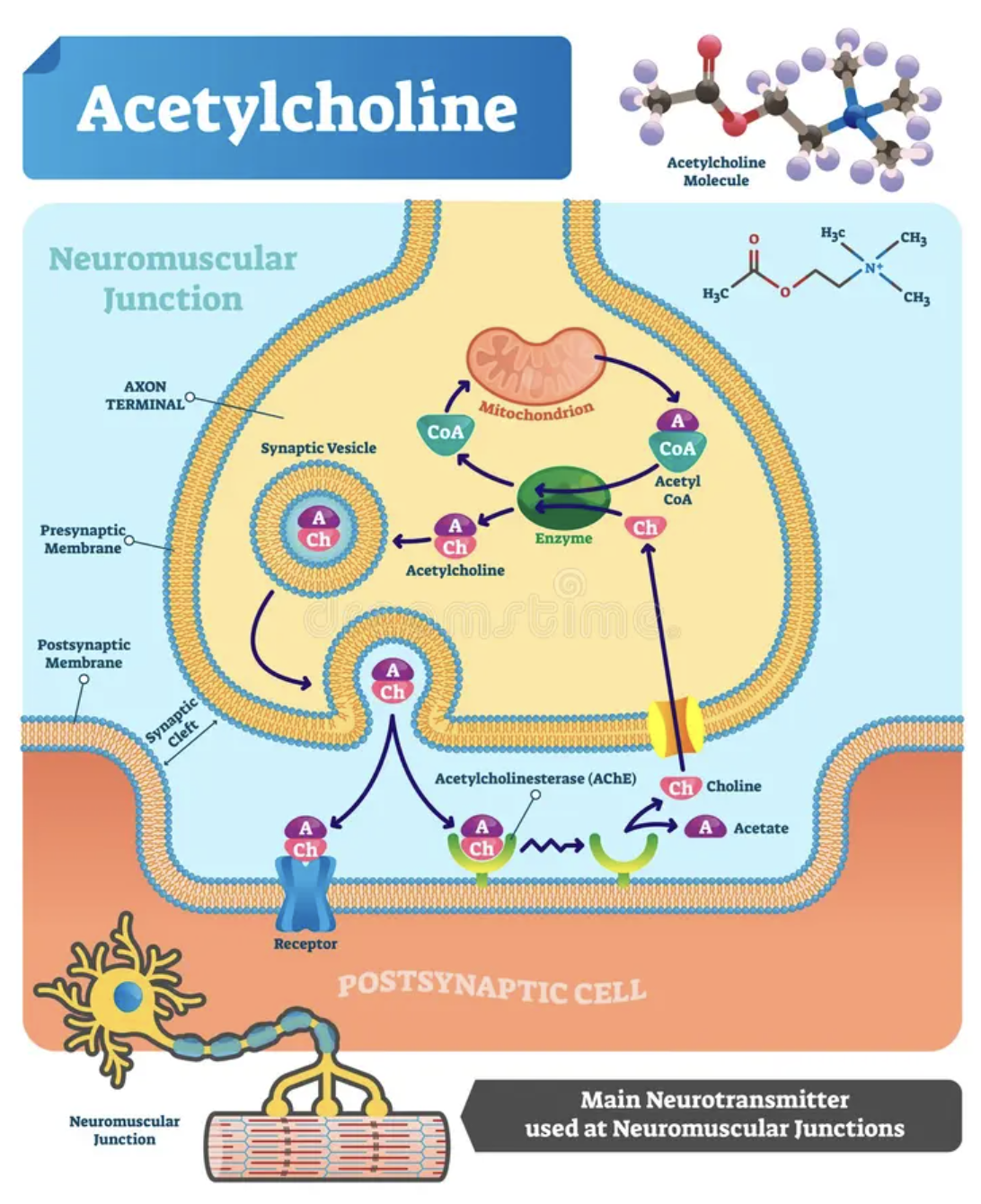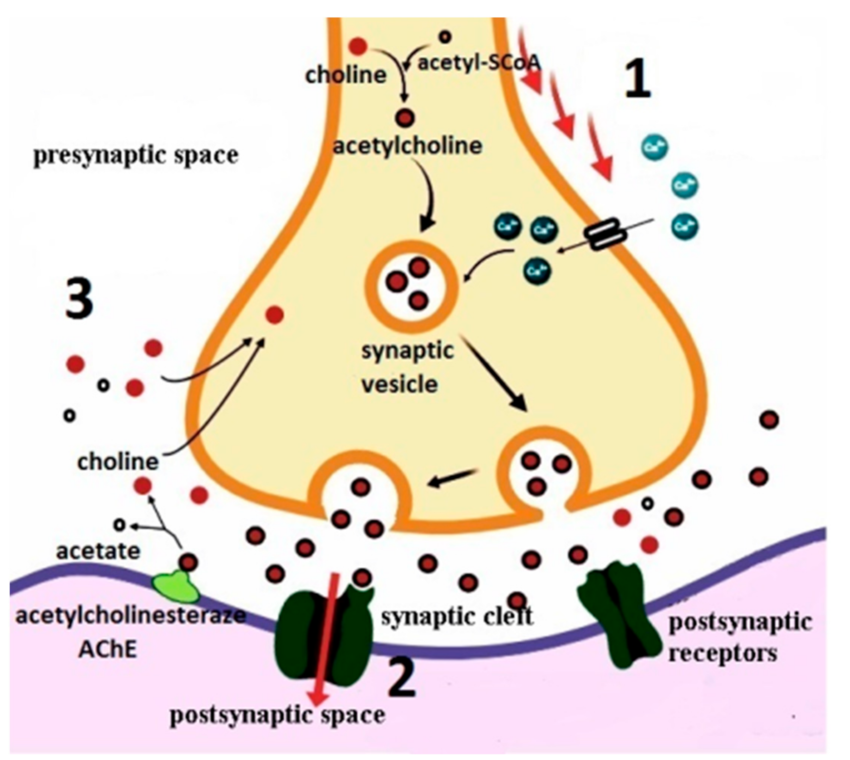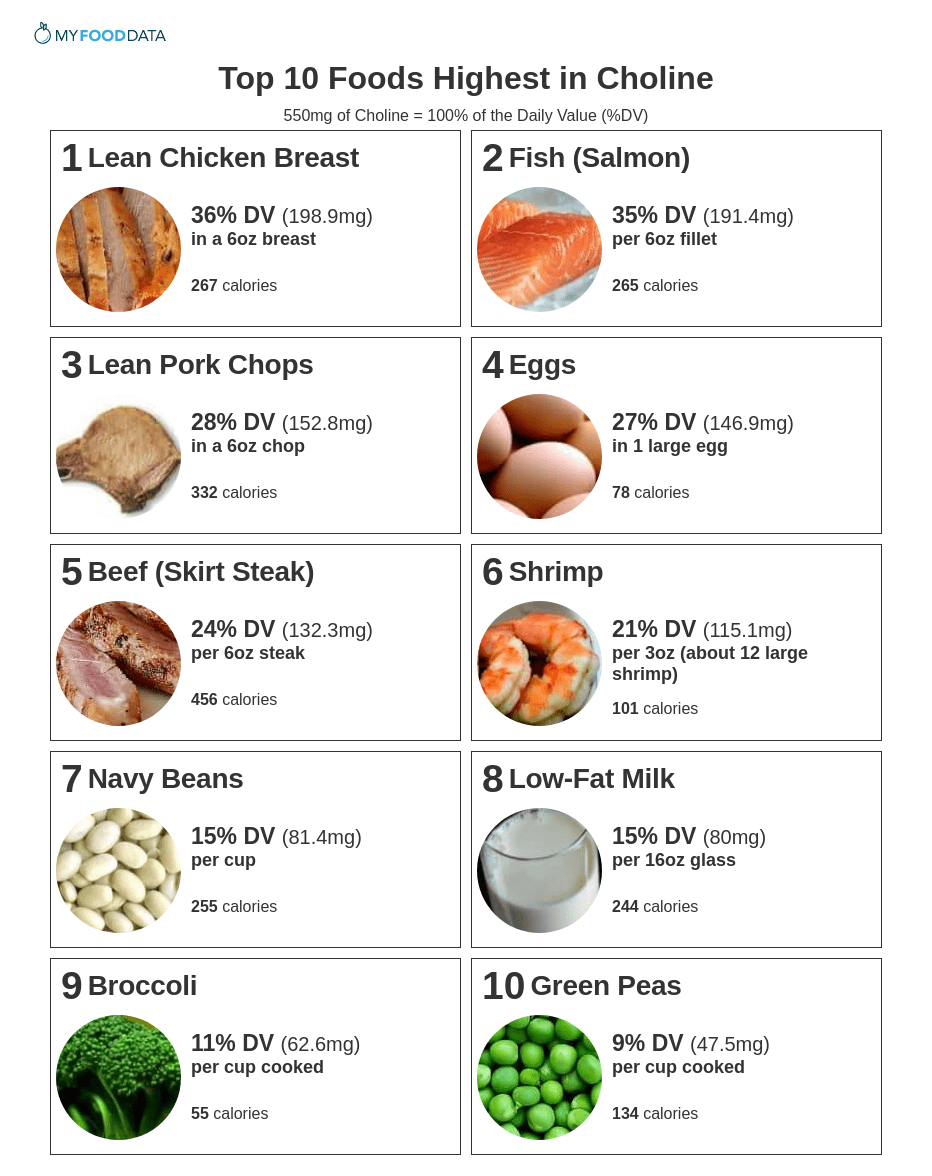Physical strength is an incredibly useful quality that hasn't lost its significance even in the age of digital technologies. It helps both in daily life and at work, and especially in emergency situations where your own health and well-being may be at risk. Of course, to be strong you need to train, train, and train again. But have you ever thought about what actually lies behind your training, what physiological processes occur, as if behind the curtains of a theatrical stage? What subtleties, problems, and tricks exist that help solve them?
Neurotransmitter Acetylcholine

Physiology. First, we need to understand what a neurotransmitter is. A neurotransmitter is a biologically active chemical substance through which a nerve impulse is transmitted to the target (final) cell. In simple terms: neurotransmitters are mediators that trigger the process of excitation (activation) of the cell. We're interested in the neurotransmitter that transmits excitation to muscle tissue cells, and this is Acetylcholine. Acetylcholine is synthesized in the endings of the motor process of a nerve cell (Axon), is captured by vesicles (carrier bubbles) and, when a nerve impulse is present, is transported by them to the boundary (synaptic cleft) between nerve and muscle tissues. Here they burst and free Acetylcholine binds with its own receptors located on the surface of the muscle cell, specifically in subneural depressions (needed to increase effective contact area). It's also important to know that it's precisely Acetylcholine that regulates the work of Calcium ion channels, which are a mandatory element of muscle contraction.
Acetylcholine is synthesized in the endings of the motor process of a nerve cell (Axon), is captured by vesicles (carrier bubbles) and, when a nerve impulse is present, is transported by them to the boundary (synaptic cleft) between nerve and muscle tissues. Here they burst and free Acetylcholine binds with its own receptors located on the surface of the muscle cell, specifically in subneural depressions (needed to increase effective contact area). It's also important to know that it's precisely Acetylcholine that regulates the work of Calcium ion channels, which are a mandatory element of muscle contraction.
Possible problems. Let's briefly discuss Acetylcholine's ability to activate Calcium ion channels (more details about ions, their influence on muscles and cramps), without which muscle contraction is impossible.
The fact is that Calcium ions are a key element linking the motor muscle proteins Actin and Myosin together, which are then set in motion with ATP energy (more about the mechanism). Accordingly, with Acetylcholine deficiency, Calcium ions cannot participate in the process of filament coupling, and therefore in muscle contraction realization. Subjectively, Acetylcholine deficiency is perceived as muscle weakness.
In this condition, full and comprehensive activation of all muscle fibers within the activated muscle group becomes impossible. If we try to visualize this experience a bit, with conditional 100 muscle fibers in the bicep, against the background of Acetylcholine deficiency, only 50 will be able to work fully (figures are abstract). Due to Acetylcholine deficiency itself, it won't be able to adequately transmit nerve excitation to muscle tissue, and moreover won't be able to maintain stable opening of Calcium channels, even when necessary.
The condition of Acetylcholine deficiency is the prerogative of old age, but young athletes can also have problems with this in the presence of:
- Chronic stress and overwork;
- Nutrient deficiency and dietary restrictions;
- Genetic factors related to insufficient production, excessive inhibition by the enzyme Acetylcholinesterase (makes Acetylcholine inactive), as well as autoimmune disorder.
Solution
Chronic stress and overwork
With overwork, nerve cells are simply unable to synthesize enough Acetylcholine. But first, it's worth understanding whether you have overtraining, and therefore chronic fatigue. Common signs include: fatigue, lack of motivation, poor sleep and appetite. Excessive mental and/or physical activity exhausts nervous system resources and if this has happened, all you need to do is arrange days full of rest and exclude even cardio. No physical or psycho-emotional stress. To assess overwork, it will be enough to take a cortisol test (stress hormone), which will show the body's fatigue level.

From my own experience, I can give the following recommendations:
- when exceeding the norm by 5-10% - rest 4-5 days;
- when exceeding the norm up to 50% - rest 7-10 days;
- when exceeding the norm from 50% to 100%, which is an extremely rare phenomenon - complete rest should be no less than 2 weeks.
At the end of each period, cortisol control is mandatory.
Nutrient deficiency and dietary restrictions
From food we get a substance called choline, which later, already in the body, combining with an acetyl group forms our neurotransmitter. Choline can be partially synthesized in the body, but only 10% of the real need. The remaining 90% must be obtained from food. It's not entirely obvious and not quite popular to know about this and think about it, but physiological needs don't become any less because of this. So, let's understand choline sources:

An adult needs 425 to 550 mg of choline per day, and as practice shows, getting them is not so easy. As a rule, it's either too expensive (black caviar) or too voluminous (1 kg of chicken per day). The most adequate source of choline is eggs and beef liver. And if liver can be called a product for enthusiasts, then an omelet from 3-4 eggs, for productive training and brain activity, is not too big a problem for many of us.
But what to do if you have an allergy or simply dislike eggs? Don't worry, the chemical industry has taken care of you. The market has many precursors of acetylcholine, which when entering the body turn into the substance we need without any eggs.
The most accessible are preparations based on glycerophosphocholine and phosphatidylcholine. Don't let the compound components frighten you—glycerin and phosphate. Glycerin and phosphate are not only not harmful, but are important in our body's life (glycerin participates in fat metabolism, and phosphate is a structural component of our bones). When entering the body, glycerin/phosphate detaches, and an acetyl group attaches to choline, forming biologically active Acetylcholine. There are many supplements based on these two compounds and acquiring them is not difficult, for example on iHerb.
Genetic factor
There are three types of unpleasant heredity:
1. Too little Acetylcholine is produced, even with adequate choline intake;
In this condition, our body is unable to synthesize the necessary amount of choline. However, of all genetic factors, this carries the least number of problems. As we already learned, only 10% of the necessary amount of choline comes from body synthesis, which means to solve this problem we simply need to consume it from food a bit more than all other people.
2. The body synthesizes too much of the enzyme Acetylcholinesterase, which destroys Acetylcholine itself;
Excitation of any cell cannot last forever. After each "work" there must be rest. For a cell to quickly come to a state of rest, it's necessary first of all to remove all excess Acetylcholine. This role is assigned to a special enzyme—Acetylcholinesterase. This substance is an inhibitor. This means that upon contact with Acetylcholine, Acetylcholinesterase inactivates our mediator, breaking it down to its original components—choline and acetate.
There's a rather rare genetic deviation in which excessive concentration of Acetylcholinesterase is observed. Because of this, it's harder for cells to reach action potential (excitation) and in the case of muscle tissue we observe sensations of weakness and rapid fatigue.
If you feel chronic fatigue, you get tired quickly, but cortisol (stress hormone) is normal—it won't be superfluous to take tests for Acetylcholinesterase and antibodies to Acetylcholine receptors (about this below). The test isn't cheap, but it exists and large laboratories conduct it. There are also drugs capable of inhibiting Acetylcholinesterase itself. However, in this case self-treatment is categorically inadmissible, as overdose can cause severe spasm, up to respiratory arrest. With confirmed excess Acetylcholinesterase, be sure to consult a neurologist.
3. Myasthenia. Autoimmune reaction of the body to Acetylcholine receptors.
In Myasthenia, mutations occur in genes of proteins responsible for Acetylcholine receptor formation. Because of this, our own immune system recognizes such formations as foreign and tries to destroy them. As a result, the active number of Acetylcholine receptors is reduced and not capable of binding with sufficient amounts of Acetylcholine. All this also leads to muscle weakness development and rapid fatigue. Fortunately, the disease isn't hereditary and occurs quite rarely (4-5 people per 100,000 population), however in recent years statistics are getting worse.
With symptoms present, it would be advisable to take tests not only for the enzyme Acetylcholinesterase, as discussed above, but also for antibodies to Acetylcholine receptors.
Therapy is similar—using acetylcholinesterase inhibitors. Since if we reduce the concentration of this enzyme, then the number of successful "receptor-acetylcholine" complex connections will become higher, which means cells will be able to develop action potential (more about action potentials).
And again, with confirmed pathology presence, be sure to consult a neurologist, since self-treatment can be dangerous to your health.
Conclusion
Here we conclude the first chapter on "Strength Factors," but this is only the beginning and much more interesting awaits us ahead. Page by page you'll learn and comprehend the secrets of your body, so that henceforth you won't wander but go toward the goal having a clear understanding of your body's work. Understanding how it functions, what problems it experiences, and how to help it. Strength is in knowledge, strength is in you!
Have questions or just want to discuss the article material?
Write to me anytime and I'll definitely try to help you!
For all types of communication:
